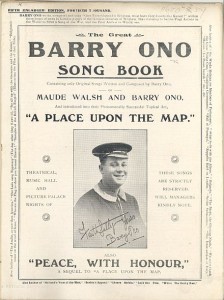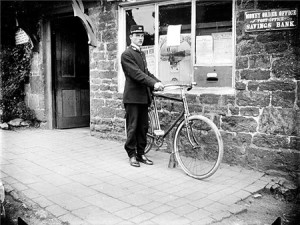 Barry Ono was a British variety theatre performer,music hall singer and collector of Penny Dreadfuls. Part of his is collection was bequeathed to the British Library in 1941. It is still there and available for research. This obituary was found in Collectors Miscellany (Fourth Series Issue 3 – February, 1942). It was an ephemeral “paper for anyone interested in old boys’ books, type specimens etc.,” and was founded in 1917 by Joseph Parks.
Barry Ono was a British variety theatre performer,music hall singer and collector of Penny Dreadfuls. Part of his is collection was bequeathed to the British Library in 1941. It is still there and available for research. This obituary was found in Collectors Miscellany (Fourth Series Issue 3 – February, 1942). It was an ephemeral “paper for anyone interested in old boys’ books, type specimens etc.,” and was founded in 1917 by Joseph Parks.
Barry Ono
An appreciation by his friend, John Medcraft.
The recent sad death of Frederick Valentine Harrison, better known as Barry Ono, at the comparatively early age of 68, came as a shock to his many friends. Although apparently in good health at the time, he had a severe heart attack at 11pm on Wednesday, February 5, 1941, and died from angina pectoris four hours later. An able and talented man, Barry Ono had the ability to shine in more than one profession, nut his activities and interest were many, and his life too full of permit just that little extra effort necessary to reach the top. An ex-councillor of Camberwell, he was also an active member of the Water Rats, the well-known music hall charitable organisation. Music hall audiences will remember his dual act with Maud Walsh, billed as Barry and Walsh, and afterwards as a solo turn in ‘An Old-Time Music Hall in 12 Minutes,’ which heralded a boom in the old songs about ten years ago. Latterly, he had retired from the Halls and devoted more of his time to the old Bloods and Dreadfuls he loved and with which his name will ever be associated. Known to the book trade as the ‘Penny Dreadful King,’ and to collectors and sentimentalists as the high priest of the cult of the penny dreadful, Barry Ono was proud of having attracted many new collators to the hobby. His fine collection contained many extremely rear items, some of which were probably unique, and was a never-failing source of wonder, admiration, and good-natured envy to those who were privileged to view it. Barry Ono retired to Barnstaple in September, 1940, but keenly felt the severance from his old friends and the haunts and interests of a lifetime. His collection is stored for the duration of the war, and will probably be handed over to the British Museum at the end of hostilities. Wartime railway restrictions denied Barry Ono a last resting-place in his beloved London, and he was buried at Barnstaple, on February 10, 1941.
 Found in a scrapbook of clippings and manuscript material dating from c 1914 – 1930 and entitled ‘Gags ‘ is this written down ditty called ‘Ragtime Postman’. We are informed that the first verse should be sung ‘ by 4 with movement ‘.
Found in a scrapbook of clippings and manuscript material dating from c 1914 – 1930 and entitled ‘Gags ‘ is this written down ditty called ‘Ragtime Postman’. We are informed that the first verse should be sung ‘ by 4 with movement ‘.
